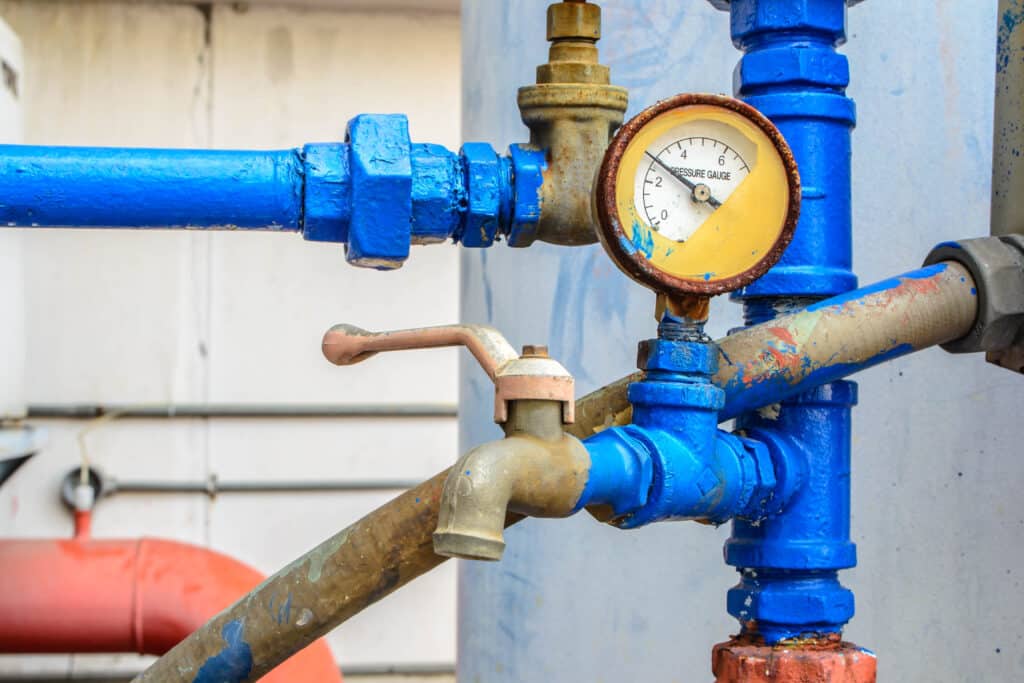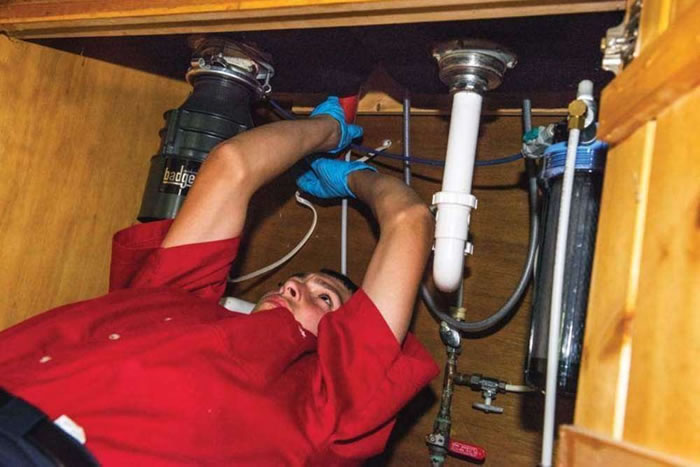What're your thoughts regarding 9 Reasons for Low Water Pressure in Your House?

Low water pressure in your home can be an irritating trouble, influencing every little thing from showering to cleaning recipes. If you're experiencing weak water circulation, there are numerous feasible causes and remedies to check out. In this overview, we'll review common reasons for low tide pressure and sensible steps to address the problem effectively.
Intro to Low Water Pressure
Low tide pressure occurs when the flow of water from your faucets, showers, and various other fixtures is weak than usual. This can make everyday tasks more challenging and much less reliable. Comprehending the reasons for low tide stress is essential to finding the ideal remedy.
Typical Root Causes Of Low Water Stress
Pipeline Obstructions
Gradually, pipes can end up being blocked with natural resource, sediment, or particles, restricting the circulation of water. This is a typical concern in older homes with galvanized steel pipes.
Corrosion
Deterioration within pipes can cause leakages and decreased water pressure. Rust accumulation can tighten water circulation, especially in aging plumbing systems.
Faulty Pressure Regulatory Authorities
Pressure regulators are in charge of keeping consistent water pressure in your house. If they malfunction, it can cause low water pressure or irregular flow throughout the house.
Municipal Water Supply Issues
In some cases, the issue lies outside your home. Municipal supply of water concerns, such as main line leaks or maintenance work, can briefly lower water stress in your location.
Just How to Diagnose Low Tide Pressure
Examining Faucets and Components
Start by evaluating the water pressure at various faucets and fixtures throughout your home. If the problem is separated to particular locations, it may indicate local problems.
Checking Pipelines
Inspect noticeable pipes for signs of leaks, rust, or clogs. Pay attention to any uncommon audios, such as knocking or rattling pipes, which might indicate issues within the plumbing system.
Consulting with a Plumber
If you're incapable to pinpoint the source of low tide pressure, consider hiring a specialist plumber to conduct a comprehensive inspection. They can determine underlying problems and advise ideal options.
Do It Yourself Solutions to Deal With Low Water Stress
Cleansing Aerators and Showerheads
Mineral deposits can build up in aerators and showerheads, decreasing water circulation. Eliminate and clean these components frequently to improve water stress.
Flushing Water Heater
Sediment buildup in the hot water heater can restrict circulation and minimize effectiveness. Flushing the container periodically helps eliminate sediment and maintain optimum efficiency.
Examining Stress Regulatory Authority
Ensure that the stress regulatory authority is operating appropriately. Adjusting or replacing the regulator can aid restore appropriate water pressure throughout your home.
Clearing Clogs in Pipes
For small clogs, try making use of a plumbing snake or chemical drain cleaner to clear blockages in pipes. Beware when using chemicals and adhere to safety and security guidelines.
When to Call a Specialist Plumber
If DIY initiatives fail to deal with the problem or if you believe substantial plumbing problems, it's finest to look for assistance from a licensed plumber. They have the experience and devices to attend to intricate issues securely and efficiently.
Preventive Measures to Preserve Water Pressure
Regular Maintenance
Set up regular upkeep for your plumbing system to avoid issues such as deterioration, leakages, and blockages. Dealing with minor issues early can assist prevent more substantial repair services in the future.
Setting Up a Stress Booster
Think about mounting a pressure booster pump to improve water pressure in locations with continually reduced circulation. This can be specifically helpful for multi-story homes or buildings with high-demand fixtures.
Surveillance Water Usage
Bear in mind water usage practices and avoid overtaxing the plumbing system. Basic changes, such as staggering showers and laundry tons, can assist preserve sufficient water stress.
Verdict
Taking care of low water stress can be irritating, but determining the underlying causes and applying proper options can bring back optimum flow throughout your home. Whether it's cleaning aerators, evaluating pipes, or speaking with a plumber, taking aggressive steps can guarantee a stable supply of water for your daily needs.
FOUR WAYS TO FIX LOW WATER PRESSURE NOW
Turning on a shower or faucet only to find the water comes out in a sad, slow drizzle is never a good feeling. How exactly are you supposed to wash a pan or take a quick shower when it takes 10 minutes just to rinse off a little soap? The good news is that when your water pressure is bad, there's always a cause: typically one that can be easily fixed. Here are some of the most common causes of low pressure and what you can do to fix the issue:
DEBRIS AND MINERAL DEPOSIT BUILDUPS
If you notice low water pressure from just one or two of the fixtures in your house, the problem likely has to do with debris buildup. Water is full of minerals and other debris, all of which can accumulate in your pipes and on your fixtures. This can cause a blockage that affects how much water flows through. To fix this, try filling a small plastic bag with white vinegar, and use a rubber band to hang it around your showerhead or faucet. Let the head of the fixture soak for a few hours, and the vinegar should loosen the deposits.
WATER LEAKS
Leaks are another common cause of low water pressure. If water is flowing out of your plumbing through a hole or crack before it can reach your fixture, the pressure coming out of the faucet or showerhead will be lower. A plumbing professional is your best bet for finding and repairing a leak in your water supply pipes.
Leaks are another common cause of low water pressure. If water is flowing out of your plumbing through a hole or crack before it can reach your fixture, the pressure coming out of the faucet or showerhead will be lower. A plumbing professional is your best bet for finding and repairing a leak in your water supply pipes.
FOUR WAYS TO FIX LOW WATER PRESSURE NOW
Turning on a shower or faucet only to find the water comes out in a sad, slow drizzle is never a good feeling. How exactly are you supposed to wash a pan or take a quick shower when it takes 10 minutes just to rinse off a little soap? The good news is that when your water pressure is bad, there's always a cause: typically one that can be easily fixed. Here are some of the most common causes of low pressure and what you can do to fix the issue:
DEBRIS AND MINERAL DEPOSIT BUILDUPS
If you notice low water pressure from just one or two of the fixtures in your house, the problem likely has to do with debris buildup. Water is full of minerals and other debris, all of which can accumulate in your pipes and on your fixtures. This can cause a blockage that affects how much water flows through. To fix this, try filling a small plastic bag with white vinegar, and use a rubber band to hang it around your showerhead or faucet. Let the head of the fixture soak for a few hours, and the vinegar should loosen the deposits.
WATER LEAKS
Leaks are another common cause of low water pressure. If water is flowing out of your plumbing through a hole or crack before it can reach your fixture, the pressure coming out of the faucet or showerhead will be lower. A plumbing professional is your best bet for finding and repairing a leak in your water supply pipes.
Leaks are another common cause of low water pressure. If water is flowing out of your plumbing through a hole or crack before it can reach your fixture, the pressure coming out of the faucet or showerhead will be lower. A plumbing professional is your best bet for finding and repairing a leak in your water supply pipes.
A VALVE ISSUE
If you have low water pressure throughout your home, check your main shut-off valve to make sure it's completely open. You may also want to see if there's a pressure-reducing valve installed. If there is, have a plumber help you adjust the settings to get the pressure you're looking for.
OTHERS USING WATER
Believe it or not, your low water pressure could be caused by your neighbors. If you notice low pressure at certain times of day, it may be because you and the people living next to you have similar schedules - when everyone is showering at the same time, the pressure will be lower in every home. Low pressure throughout the neighborhood may also be caused by an issue with your municipal water supply. If that's the case, call the supplier to see if they're working on the issue.
https://www.rotorooter.com/blog/water-leaking/low-water-pressure-fixes/

We were shown that write-up about 9 Reasons for Low Water Pressure in Your House from an associate on another website. Those who enjoyed reading our post please consider to pass it around. We cherish your readership.
Call Today